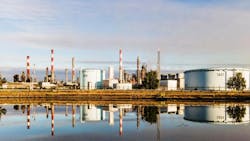TotalEnergies lets contract for Grandpuits refinery-to-renewables project
TotalEnergies SE has let a contract to Air Liquide SA to supply renewable, low-carbon hydrogen for production of sustainable aviation fuel (SAF) as part of the operator’s Project Galaxie repurposing of its 101,000-b/d Grandpuits refinery at Seine-et-Marne near Melun in northern France. TotalEnergies intends to convert the site into a zero-crude industrial platform by 2025 (OGJ Online, Sept. 28, 2020).
As part of the long-term supply contract, Air Liquide will invest more than €130 million to build and operate a grassroots hydrogen production unit (HPU) based on its proprietary Cryocap carbon-capture technology, TotalEnergies and Air Liquide said Nov. 22.
Configured to partly use recycled residual biogas from the SAF biorefinery under construction at Grandpuits, the new HPU will produce more than 20,000 tonnes/year (tpy) of renewable, low-carbon hydrogen, most of which will be returned to the biorefinery to enable additional SAF production.
By replacing natural gas typically used to produce hydrogen with the biorefinery’s recycled residual biogas, the HPU will reduce carbon dioxide (CO2) emissions by about 150,000 tpy compared with existing hydrogen production process, while its use of Cryocap technology will capture more than 110,000 tpy of CO2 for reuse in food and industrial applications, according to the companies.
Alongside supporting the operator’s conversion of Grandpuits into a zero-crude industrial platform, TotalEnergies and Air Liquide said the combined low-carbon, CO2-capturing HPU project at Grandpuits is part of a broader collaboration to support TotalEnergies’ plan to decarbonize all hydrogen used at its European refineries by 2030.
This latest contract for the more than €500-million Project Galaxie at Grandpuits follows TotalEnergies’ recent agreement with SARIA AS GmbH & Co. KG to partner on SAF production at the site (OGJ Online, Sept. 26, 2022).
Already under way, Project Galaxie includes construction of the new biorefinery that will use Honeywell UOP LLC’s proprietary UOP Ecofining technology to process what initially was planned to be 400,000 tpy of mostly animal fats from Europe and used cooking oil—supplemented with other vegetable oils like rapeseed but excluding palm oil—primarily from local suppliers to produce 170,000 tpy of SAF; 120,000 tpy of renewable diesel; and 50,000 tpy of renewable naphtha for production of bioplastics.
TotalEnergies—which discontinued crude oil refining at Grandpuits in first-quarter 2021 and will cease storage of petroleum products at the site by late 2023—most recently said it remains on schedule to commission new units at Grandpuits in 2022-24 to reach full operation of the zero-crude platform by 2025.
Supplying SAF to French aircraft operators since 2021, TotalEnergies also began producing SAF in early 2022 at its 253,000-b/d integrated Normandy refining and petrochemicals platform in Gonfreville l’Orcher, France (OGJ Online, Apr. 28, 2022).
The company also has confirmed it is working on pilot units near its 227,000-b/d Leuna refinery in central Germany to make molecules that can be converted into methanol and SAF using green hydrogen and captured CO2 (OGJ Online, Sept. 19, 2022).
The downstream projects are part of TotalEnergies’ broader commitment to achieve net-zero emissions across its global operations by 2050 in accord with its commitments under the Paris Agreement.
About the Author
Robert Brelsford
Downstream Editor
Robert Brelsford joined Oil & Gas Journal in October 2013 as downstream technology editor after 8 years as a crude oil price and news reporter on spot crude transactions at the US Gulf Coast, West Coast, Canadian, and Latin American markets. He holds a BA (2000) in English from Rice University and an MS (2003) in education and social policy from Northwestern University.

